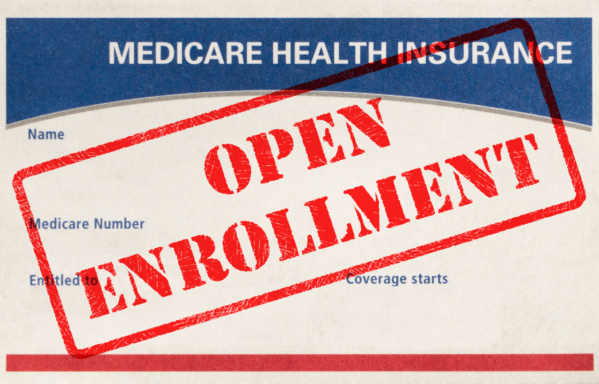
This year’s Medicare open enrollment season, which began on October 15, comes at a concerning time for the program. There are several crosswinds buffeting Medicare right now, including a government shutdown — and reckless Trump administration cuts at the Centers for Medicare and Medicaid Services. Add to that the increasing dysfunction in the privatized Medicare Advantage program, and you have a higher stakes enrollment season for seniors. We asked our senior health policy expert, Anne Montgomery, to answer some commonsense questions about enrolling in Medicare at this potentially fraught and confusing moment.

Q: Who needs to participate in Medicare open enrollment? Everyone on Medicare?
ANNE: Yes, everyone on Medicare. Whether they are entering the program (turning 65) or have been in it for some time, everyone should examine their options. If someone has already made a choice, they don’t have to change, but it’s always wise to look around and see what’s available. Medicare Advantage (also known as MA or Medicare Part C) is becoming increasingly dominant, with substantial marketing behind it as well. It’s important to understand that open enrollment runs through December. Do your homework: look at providers, drug coverage, and whether your medications are on the formulary. There are many things to check.
Q: What are the most important things for beneficiaries to do or look at this open enrollment season?
ANNE: This is a complicated season, made more so by the ongoing government shutdown. Thankfully, benefits and provider payments are not affected, but parts of Medicare’s administration are running on fumes. If you call 1‑800‑MEDICARE, you may not be able to get through right now, so it’s harder to get good information during a shutdown. The best option right now is to contact your State Health Insurance Assistance Program (SHIP). You can make appointments by phone or in person to sit down with someone who can answer your questions. In my opinion, this is the best way to get informed and explore your options.
Q: We are skeptical of Medicare Advantage as a choice for seniors, given the disadvantages we’ve noted over the years. What should people be cautious about when considering Medicare Advantage?
ANNE: Medicare Advantage plans can look attractive because they make enrollment easy with bundled coverage—you don’t need to think separately about Parts A, B, and D. Many Medicare Advantage plans are like HMOs with limited networks of providers and prior authorizations for care. If you need expensive treatments for cardiac issues or chronic disease, MA plans are notorious for delaying or denying payment for costly services and medications. Beneficiaries can be left financially and legally vulnerable. The appeals process is stressful and sometimes requires legal assistance, which is an added burden.
Q: This year we’ve seen major Medicare Advantage insurers pull out of the market or scale back services. Should this be a concern when choosing a plan?
ANNE: Yes, absolutely. If you sign up for a plan and it later withdraws from your region—these are, after all, for-profit enterprises—you may have to switch mid-course, which is especially difficult during active treatment. This is why personalized, unbiased counseling is crucial. Remember, Medicare Advantage brokers operate under financial incentives, while SHIP staff provide neutral guidance.
Q: The Washington Post reports that a new Trump administration directory designed to help seniors compare Medicare Advantage providers is riddled with errors. How should enrollees handle that?
ANNE: I haven’t tried it myself, but it’s meant to help people identify providers in a simple, comprehensive way. Unfortunately, it has glitches and isn’t yet the reliable resource it was promised to be. That doesn’t mean it can’t improve over time. But for now, it’s a flawed tool and not a complete solution.
Q: Many people are trying to switch out of Medicare Advantage during open enrollment. What obstacles might they face returning to traditional Medicare?
ANNE: There isn’t a structural obstacle, per se. You can still dis-enroll… and many people do after realizing the disadvantages of Medicare Advantage. However, if you return to traditional Medicare and want to buy a Medigap supplemental insurance policy to help with deductibles and co-pays,you may need medical underwriting if you’re more than five months past your 65th birthday. That means if you have pre-existing conditions, your monthly premiums could be significantly higher—or you may be denied a Medigap policy altogether.
Q: How concerned should we be about the Trump administration’s changes to traditional Medicare, such as using AI bots for prior authorizations?
Answer: It’s an interesting development. Prior Authorization has long existed in Medicare Advantage through administrative contractors who are brought in to flag potential overuse by providers. The concern is that AI‑driven prior authorizations in traditional Medicare—run by organizations whose motives aren’t fully clear—might be used in the same restrictive way. That hasn’t happened yet, but if it does, it could harm beneficiaries. All in all, we’d rather have human beings making decisions about our healthcare instead of bots.
Q: The Trump administration has reduced staff at the Centers for Medicare and Medicaid Services. Is that affecting Medicare’s administration?
Answer: It’s difficult to say definitively, but we’re seeing longer wait times and reduced availability for public-facing services like 1‑800‑MEDICARE. Layoffs and budget cuts weaken administrative support, and the problem will grow if these agencies continue being targeted. This pattern extends beyond Medicare. We are seeing it at the Social Security Administration, the Department of Education, HUD, and even air traffic control. Wantonly cutting staff in this way has serious consequences.
Q: Has the government shutdown had any direct effects on Medicare?
ANNE: The hotline is slower, but still functional. It’s taking longer for people to get appointments or resolve administrative issues, and the strain increases the longer the shutdown continues. The good news is that no one’s benefits have been directly affected so far. Regardless, it would be in the program’s best interests if the shutdown ended as soon as possible.
*********************************************************************
Listen to Anne Montgomery on our podcast episode entitled, “For Bots’ Sake, Keep AI out of Medicare!” here.
Don’t forget to watch our new historical documentary, “Social Security: 90 Years Strong.”


